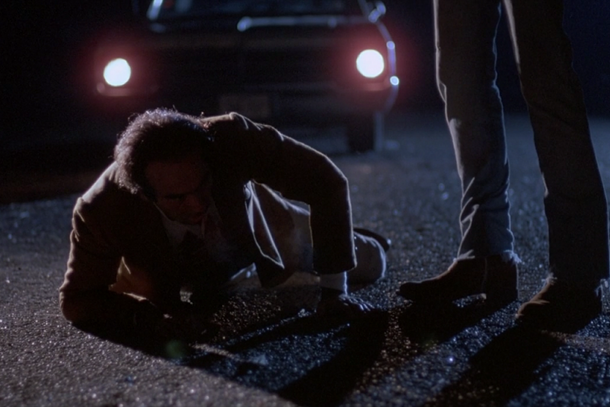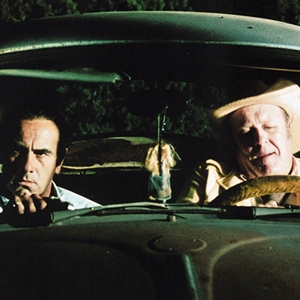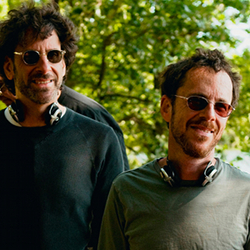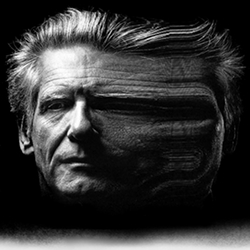
TIFF’s Joel & Ethan Coen - Tall Tales Review: Blood Simple (1984) - NP Approved

Cast: John Getz, Frances McDormand, Dan Hedaya
Director: Joel Coen, Ethan Coen
Country: USA
Genre: Crime | Thriller
Editor’s Notes: The following review is part of our coverage for TIFF’s Joel & Ethan Coen: Tall Tales which runs from November 28th to December 20th at TIFF Bell Lightbox. For more information on upcoming TIFF film series visit http://tiff.net and follow TIFF on Twitter at @TIFF_NET.
Film-noir characters always had the right moves no matter what the circumstances were. They lurked in shadows to conceal their faces in the stark inky blacks of black and white photography, fell into circumstances beyond their control but always managed to maintain the upper hand in adverse situations, and smoked cigarettes that filled the frame with obfuscating vapor and gave them memorable baritone voices with which to deliver street-smart witticisms and unforgettable dialogue. They didn’t always know the full score but they still managed to make compelling anti-heroes and rogues with hearts of gold, street-wise but dismissive of scholarly knowledge that had little use in their seedy worlds of ambiguous good and evil. In the Coens’ first feature film, Blood Simple, they managed to turn those noir tropes on their head and prove that characters thrust into film-noir scenarios could be bumbling and unaware that a plot is unraveling around them and still be compelling to watch. They would use borrowed film-noir formulas and manipulate genre tropes and breathe new life into them in later films like The Big Lebowski and The Man Who Wasn’t There, but their debut feature reveal the Coens’ cinematic fascinations and their innate gift of taking those fascinations in new directions to create something wholly unique.
In the Coens’ first feature film, Blood Simple, they managed to turn those noir tropes on their head and prove that characters thrust into film-noir scenarios could be bumbling and unaware that a plot is unraveling around them and still be compelling to watch.
The noir framework of the story is older than cinema itself; a femme fatale cheats on her affluent husband with a strong silent protector, and a private investigator gathers salacious photographic evidence that sets off a chain of events that ends in tragedy. The real power of Blood Simple is derived from the Coens’ cinematic eye and ability to create compelling dramas despite the odds being overwhelmingly stacked against characters that come from our world rather than the romanticized cinematic world of film-noir. The characters in Blood Simple make mistakes, exacerbate their circumstances on the basis of faulty assumptions, and prove that still waters can also run shallow.

The Coens know that one of the most compelling vantage points in cinema is behind the rain-soaked windshield in a car at night, creating tension with each passing set of headlights that explode into fragmented jewels of lustrous yellow and white as they draw closer, and hiding the misdeeds of miscreants and night-owls. They trade in the shadows and darkness of the film’s noir predecessors for dive-bar neon that illuminates doomed characters’ faces with unnatural colors to forge a neon-noir aesthetic that allows itself to let go of the old traditions and uses intriguing elements from the contemporary world (as contemporary as the world could get in rural Texas in 1984) to create a style that is simultaneously familiar and extraordinary. A bug zapper mocks the restrained rage of scorned husband Julian Marty (Dan Hedaya), illuminating his face in effulgent shades of blue that reveal his broken heart as bugs seemingly commit suicide to punctuate his rage during a confrontation with his former bartender and wife’s current lover, Ray (John Getz). Pieces of broken glass scattered across a hardwood floor turn a crime scene into a brilliant display of light dancing across rare gems, a more intriguing and dramatic display than the dead body that lies somewhere outside of the frame.
The Coens know that one of the most compelling vantage points in cinema is behind the rain-soaked windshield in a car at night, creating tension with each passing set of headlights that explode into fragmented jewels of lustrous yellow and white as they draw closer…
Four dead fish lay in furtive silence as they conceal a forgotten clue and foreshadow the potential fate of the four victims of blood, lust, and money simplicity. Private detective Loren Visser (M. Emmet Walsh) allows himself to slip into this mode of simple thought despite warning Marty of its dangers, and his money simplicity causes him to make careless mistakes and deadly underestimations. Ray is a quiet and reserved cowboy type, his coy and indifferent exterior concealing a hopelessly overwhelmed man pretending to be in control despite his obliviousness to the predicament he has become pulled into through a series of blunders and bad decisions. Marty was a conniving asshole who was obsessed with money and power, possessing both in the limited quantities that being a bar owner would allow. He treated his wife Abby like an object rather than a companion, and his mistakes would cost him his marriage and ultimately his life as his jealousy clouded his judgment and further twisted his tiny knotted soul. Abby clings to men for protection and security despite being the most intelligent character in the film. She would finally find a path to empowerment, but it would take the deaths of three of our four fish before she finds those qualities in herself. Meanwhile, the fish sit in dead-eyed silence, rotting away on Marty’s desk as four people have self-destructed from the idiocy brought upon by their “blood simplicity”, when basic primal instincts awake during times of desperation or unmitigated rage.
Blood Simple feigns cinematic simplicity through its barebones structure borrowed from classic film-noir and characters that make the same mistakes during unplanned disastrous situations that real people would make. We only know these characters through their actions during times of great pressure as the film begins with an affair and ends in death, so their minds are already conditioned to be in a “blood simple” state during the entire runtime of the film. Normal intelligence erodes during times of great emotional and physical duress, causing people to make human mistakes as they try to escape a situation and are pulled deeper in with every futile and misguided attempt to break free. Most people wouldn’t carry themselves with the cool collected demeanor of Humphrey Bogart in the face of inescapable disastrous situations, and the Coens show how real people who have lost their capacity for rationality would navigate through murder, adultery, and robbery in a unique film that launched the careers of two of cinema’s greatest filmmakers.
Related Posts
![]()
Matthew Blevins
![]()
Latest posts by Matthew Blevins (see all)

























